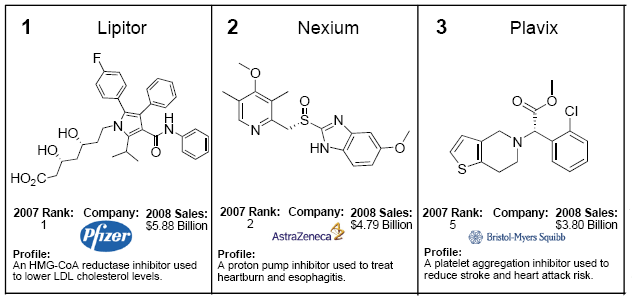Theravance and Astellas Announce FDA Approval of VIBATIV(TM) (telavancin)
Vibativ was recently approved by the FDA for the treatment of complicated skin and skin structure infections.
"We are very pleased with the FDA's approval of VIBATIV, and extremely excited about the prospect of bringing this new medicine to the market," said Rick E Winningham, Theravance's Chief Executive Officer. "This is a significant event that marks the first approved indication for VIBATIV and validates Theravance's strategies in drug discovery and development. We believe that VIBATIV will become an important medicine addressing the urgent medical need for new antibiotics to treat Gram-positive infections caused by MRSA."
Top 200 Pharmaceuticals

.....................................................................................................................................................
A research group out of Cornell University has created really interesting poster of the top 200 pharmaceutical drug names by retail sales. The poster not only ranks each name, but also shows its chemical structure.
The research group is call Njardarson Group. It is made up of visiting scientists, post-doctoral fellows, graduate students, undergraduate students and two cute canine mascots. The team focuses on the development of compounds and hopes to educate us about how chemistry positively impacts our lives.
The Top 200 pharmaceutical poster can be downloaded for free as a high resolution PDF .
Pfizer – Wyeth Merger
On January 25th, Pfizer leapfrogged over the tradition of buying smaller research companies to purchase Wyeth for 68 billion dollars. With their forces combined, Pfizer/Wyeth becomes the 4th largest US-based company; Exxon, Walmart, and Proctor & Gamble hold the top three spots. The merger process can be complicated and delicate to finagle on the finance end but the branding or re-branding process should be approached with just as much care.
During a re-branding of this size it is important to approach the naming process with an open mind; having the larger company name always win out over the smaller company name might not always be the best choice for company morale or client impressions. The four naming options, as I see them are:
Read more
Happy 110th Merck Manual!

......................................................................................................................................................................
The year 2009 marks the 110th anniversary of The Merck Manual, the best-selling and oldest continuously published general medical text in the English language. And what a 110 years it has been!
It all started in 1899, when the American drug manufacturer Merck & Co. published a small book titled Merck's Manual of the Materia Medica. According to their website, the book was meant as an aid to physicians and pharmacists, reminding doctors that “Memory is treacherous.”
In 1899 the Manual cost $1, about as much as a week’s groceries. Now the Merck Manuals, divided
Read more
Rember's Early Success
The drug called Rember (methylthioninium chloride) is receiving substantial press in the news and medical world for its success in slowing the progress of mental deterioration associated with Alzheimer’s disease. The Alzheimer's drugs currently available {Aricept, Exelon, Razadyne (previously Reminyl), Cognex, and Namenda} have been said to only ease the symptoms of the mind-robbing disease.
Developed by Singapore-based TauRx Therapeutics, Rember is an experimental drug that takes a new approach to treating the disease by targeting the build up of a specific protein in the brain called Tau. Tau causes tangles that accumulate inside memory cells, and destroys them during the process. Rember is designed to target these Tau tangles, therefore leading to positive results for reducing mental decline.
If clinical trials continue to be successful and sustainable, this is ground-breaking news for the medical industry and for individuals battling with this debilitating disease. The name itself is memorable (no pun intended), straightforward and distinctive. In today's regulatory environment, getting a name like this approved signifies a major homerun for the company.
Trend Watch: Drug Delivery

......................................................................................................................................................................
As pharmaceuticals are becoming more sophisticated, the need for targeted and effective modes of administration is becoming more apparent: a trend that is not being ignored by companies worldwide. Drug delivery is an increasingly dynamic sector of the pharmaceutical industry, and it may prove to be one of the most interesting areas of growth over the next decade.
Zipzor
Xanodyne Pharmaceuticals, Inc. Receives Approvable Letter From the U.S. FDA for ZIPSOR(TM) Capsules.
Contributed by Laine Beyerl
Banning Pharmaceutical Logos in Hospitals
A health system located in Minnesota and Wisconsin recently prohibited all branded materials within its 4 hospitals and 17 clinics. This new policy, that has been said to be “one of the toughest in the nation,” prohibits pharmaceutical companies from influencing doctors by limiting and controlling interaction between drug reps and doctors and excluding everything from pens and notepads to surgical caps and stethoscopes; essentially anything bearing a logo.
While some experts feel these materials can influence doctors to prescribe branded drugs over generics and therefore should be banned, others believe that by imposing such tight constraints important drug information and resources will be lost as well. What do you think this could mean for the future of healthcare branding?
Defending the Empty Vessel Approach to Naming

......................................................................................................................................................................
Maghan Cook, Verbal Branding Associate for Addison Whitney, was recently published in the May 2008 issue of PharmaVOICE. Please click here to view an abstract of her article on Defending the Empty Vessel Approach to Naming.
By: Trista Thielker
You Have the Flu Too?
It’s not just your imagination- it seems like everyone has been sick this flu season. Even the top 24 finalists of American Idol were unfortunate enough to fall victim to bronchitis and the flu.
What makes one flu season worse than another? Each year, different strains of the influenza virus circulate throughout the world. About nine months prior to flu season, research on the previous flu season is conducted by the four World Health Organization (WHO) Collaborating Centers for Reference and Research on Influenza. Based on these findings, each country then makes an educated decision on which viruses to use in the influenza vaccines for the upcoming season.
Sometimes the vaccinations are not a good match for the actual influenza viruses that make people sick. According to the CDC, this year’s flu vaccine has proven effective against 40% of the virus strains that are currently circulating the U.S. Although this year’s vaccine doesn’t seem to be well matched to the viruses, the track record is pretty strong. In the last 19 years, 16 have been right on target.
In this day and age where huge advancements are being made in medical science and technology, we get easily frustrated when we don’t have a solution. Can you imagine though, how difficult a task it must be to predict the next year’s flu viruses? Of course it isn’t pleasant to be sick, but I think the CDC and pharmaceutical companies deserve praise for their tireless efforts in ensuring our well-being. We can all try to take a little more responsibility for ourselves as well.
Follow these recommendations from the CDC to help avoid sickness and prevent spreading germs.
• Wash your hands frequently to decrease chances of catching the flu or cold
• If you are sick with flu, reduce your contact with others and cover your cough to help keep germs from spreading
• Get a flu shot- even when the vaccine is a less than ideal match, it still can provide enough protection to prevent or lessen illness severity and prevent flu-related complications
• Your doctor can prescribe flu antiviral drugs that can treat the flu or prevent infection with flu viruses
By: Jessica McGrail
